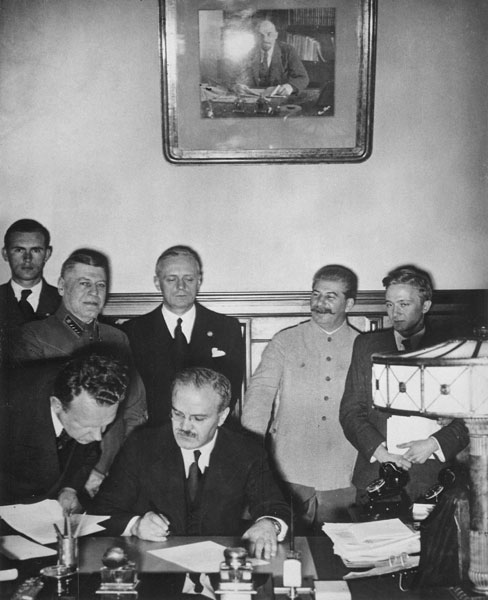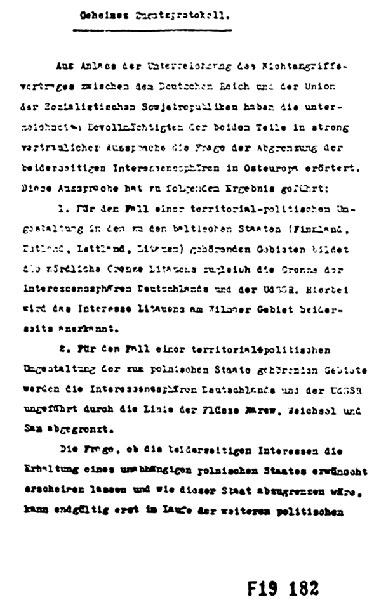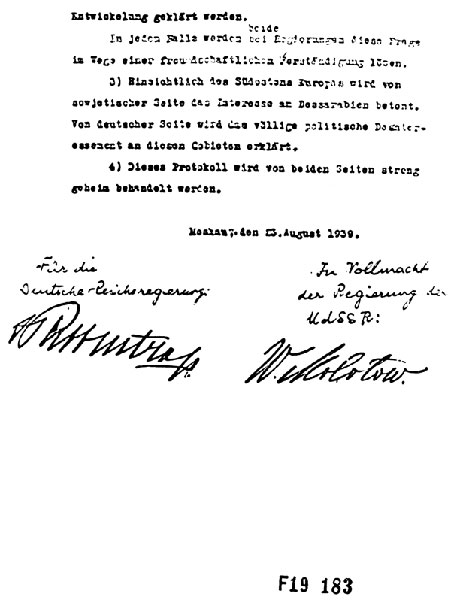Molotov-Von Ribbentrop pact 23-08-1939
The following text is the translation of the Molotov - Von Ribbentrop pact, the non-aggression treaty between the Soviet Union and Germany that was signed on August 23rd, 1939. The treaty is named after the two Ministers of Foreign Affairs who signed the treaty on behalf of their country, respectively Vyacheslav M. Molotov on behalf of the Soviet Union and Joachim von Ribbentrop on behalf of Nazi Germany. The additional secret protocol was not published at the time. In principle, the translation reflects both the German as well as the Soviet version but whereever small differences exist, the translation is based on the German version.
Non-aggression treaty between Germany and the Union of Socialist Soviet RepublicsThe German government and the government of the Union of Socialist Soviet Republics, guided by the wish to maintain peace between Germany and the U.S.S.R. and on the basis of the fundamental stipulations lying at the base of the neutrality pact that was entered into by Germany and the U.S.S.R. in 1926, have agreed to the following:
Article I.Both signatory parties pledge to abstain from any act of violence, any aggressive action or any attack on each other, be it individually or in conjunction with other parties.
Article II.If either signatory party experiences opposition by acts of war by a third party, the other signatory party shall in no way support this other third party.
Article III.The governments of both signatory parties shall in future keep in touch continuously for purposes of consultation in order to keep each other informed on issues concerning their mutual interests.
Article IV.Neither signatory party shall join any international partnership which is aimed, directly or indirectly, against the other party.
Article V.Should arguments or conflicts arise between the signatory parties over issues of whatever nature, both parties shall solve these arguments or conflicts by friendly mutual discussion exclusively or, if necessary, by enlisting the services of courts of arbitration.
Article VI.The treaty shall be entered into for a period of ten years with the provision that as long as one of the signatory parties does not give notice one year before the period of ten years expires, the validity of the treaty is considered to be automatically extended with five years.
Article VII.This treaty shall be ratified within the shortest time possible. The ratification documennts shall be exchanged in Berlin. The treaty shall come into force as soon as it has been signed.
Drafted in duplicate in German as well as in Russian language.
Moscow, the 23rd of August 1939.
On behalf of the German government:
J. v. Ribbentrop
The plenipotentiary of the government of the U.S.S.R.:
V. Molotov
Actuated by the signing of the non-aggression treaty between the German Empire and the Union of Socialist Soviet Republics, the signatory plenipotentiaries of both parties have discussed the issue of the demarcation of their mutual spheres of influence in Eastern Europe in a strictly confidential oral consultation. This consultation has led to the following result.
1. In case of a geopolitical re-arrangement of the territories belonging to the Baltic states (Finnland, Estonia, Latvia and Lithuania), the northern border of Lithuania shall simultaneously represent the border of the spheres of influence of Germany and the Soviet Union. The Lithuanian interests concerning the area around Vilna shall be recognised by both parties.
2. In case of a geopolitical re-arrangement of the territories belonging to the Polish state, the spheres of influence of Germany and the Soviet Union shall be roughly demarcated by the course of the rivers Narev, Weichsel and San. The question whether maintaining an independent Polish state is desirable for the mutual interests and how this state is to be demarcated, can only be answered definitely in the course of further political developments. In any case, both governments shall solve the issue by friendly consultation.
3. Concerning southeastern Europe, the Soviet Union has shown interest in Bessarabia. The German party has indicated to be totally uninterested politically in these areas.
4. This protocol shall be considered strictly secret by both parties.
Moscow, the 23rd of August 1939.
On behalf of the German government:
J. v. Ribbentrop
The plenipotentiary of the government of the U.S.S.R.:
V. Molotov
Definitielijst
- Nazi
- Abbreviation of a national socialist.
- neutrality
- Impartiality, absence of decided views, the state of not supporting or helping either side in a conflict.
- ratification
- Confirmation, agreement by a government or parliament of an international agreement.
- Soviet Union
- Soviet Russia, alternative name for the USSR.
Images
Information
- Article by:
- Auke de Vlieger
- Translated by:
- Arnold Palthe
- Published on:
- 17-04-2016
- Last edit on:
- 09-10-2016
- Feedback?
- Send it!






